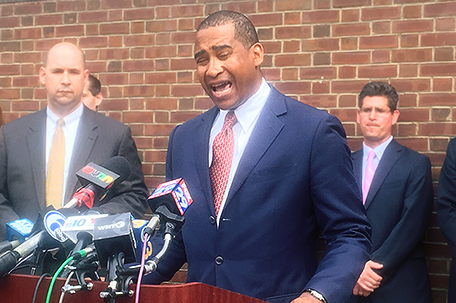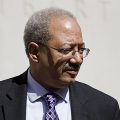ABOVE PHOTO: U.S. Rep. Chaka Fattah addresses the press after the verdict on Tuesday. (Photo courtesy: Denise Clay)
A jury finds U.S. Rep. Chaka Fattah guilty of a variety of charges including racketeering, money laundering and bribery.
By Denise Clay
U.S. Rep. Chaka Fattah resigned from his Second District Congressional seat on Thursday, just two days after being convicted on federal corruption charges.
Fattah had hoped to remain in office until Oct. 3, the day before he is to be sentenced on 22 counts including racketeering, money laundering, bribery and bank fraud, but the Republican-controlled House, led by House Speaker Paul Ryan, was preparing a vote to expel him from the chamber.
The law dictates that a special election must be called for by Gov. Tom Wolf within in 10 days of Fattah’s resignation, but doesn’t mandate when that election must be held, except to say that it must be done within 60 days of the Congressman’s departure.
While the special election could be held on Election Day, Nov. 8, and the winner could be sent to fill Fattah’s unexpired term, the earliest a special election could be held is in late August. Fattah had already lost the Democratic primary to maintain his seat to State Rep. Dwight Evans, who is heavily favored to become the Second District’s next congressional representative.
Fattah’s resignation after 22 years in Congress was the culmination of a week that led to heart stopping moments for his constituents, family and friends.
After a five-week trial before Judge Henry J. Bartle III, Fattah was found guilty of the myriad of counts, many of which carry as much as 30 years in maximum jail time.
Bartle was the same judge that oversaw the trial of Fattah’s son, Chip, who is currently doing five years in prison after being convicted of bank fraud and other offenses.
Throughout much of the trial, which went to the jury last Thursday, the congressman had a smile on his face as he sat at the defense table in Courtroom 16-A of the courthouse surrounded by his lawyers. The guilty verdicts wiped that smile away.
As he left the courtroom, Fattah, flanked by his attorneys, Samuel Silver and former Philadelphia Bar Association Chancellor Al Dandridge, tried to figure out what the Congressman was going to say to the crowd of reporters waiting outside.
He opted to say as little as possible.
“I thank the jurors for their service,” he said. “It’s been a tough day. I’m going to confer with my attorneys to talk about our next steps.”
At a press conference held later on Tuesday, U.S. Attorney Zane David Memeger praised the work of his team and said the convictions should serve as a cautionary tale to all public officials.
“Chaka Fattah Sr. and his co-defendants betrayed the public trust and undermined our faith in government,” he said. “Today’s verdict makes clear that the citizens of the Eastern District of Pennsylvania expect their public officials to act with honesty and integrity, and to not sell their office for personal gain.”
“Hopefully, our elected officials in Philadelphia and elsewhere hear today’s message loud and clear,” Memeger continued.

U.S. Attorney Zane David Memeger speaks at the afternoon press conference about the verdict and charges. (Photo courtesy: Denise Clay)
But while Fattah was the big fish in the government’s pond, he wasn’t caught alone.
Lobbyist Herbert Vederman was also convicted of racketeering, bribery, money laundering and other offenses, Karen Nicholas, former executive director of the Educational Advancement Alliance was convicted of some of the same offenses as was Solutions for Progress CEO Robert Brand.
Bonnie Bowser, Fattah’s former Chief of Staff, while she was convicted of five counts including money laundering and falsifying records, she missed being convicted on the top two counts, which carry a 30-year maximum sentence.
As the verdict was announced, Cecilia Vederman Diamond, Herbert Vederman’s sister, gasped openly, leading to Judge Bartle’s command for quiet. Family members requested an ambulance on standby just in case.
As she left the courtroom, Vederman Diamond angrily denounced the jury’s decision.
“This verdict was disgusting,” she said. “I’m very close to my brother and he’s a good person. Does he look like he belongs in jail?”
Most of the convictions stem from a $1 million loan that Fattah got from former Sallie Mae CEO Albert Lord to help finance Fattah’s 2007 Mayoral Campaign.
The verdict shows that the jury believed the prosecution’s assertion this loan was paid back using educational grants from entities including NASA and the Department of Justice. Fattah was also convicted of using funds from the Fattah for Mayor and Fattah for Congress campaigns to pay personal expenses including Chip Fattah’s Drexel University tuition.
The defense had to battle not only an extensive paper trail that the prosecution depicted as proof of an elaborate scheme of misappropriation of funds, but also the testimony of two former Fattah confidants—Gregory Naylor and Thomas Lindenfeld—who pled guilty and became prosecution witnesses.
The jury deliberated for just over three days to reach its verdict, and the deliberations themselves were not without their pitfalls. A juror was dismissed on Friday morning, which led to the jury having to restart their process.
When asked if he would resign his Congressional seat now that he’s been convicted, Fattah didn’t comment as he walked down Market Street with his lawyers trailed by television cameras and reporters.
But while there was no rule saying that he had to resign, Fattah would have been largely ineffective had he stayed in Congress until his sentencing date.
Under Rule 13, section 10 of the Code of Conduct of the House of Representatives, any member of the House convicted of a crime for which a sentence of two or more years in prison could be imposed should refrain from participating in any of the member’s assigned committees or participating in votes in the House’s Committee of the Whole until the legal situation is either resolved in the Member’s favor or unless the member is re-elected after serving his or her felony sentence.
Sentencing for Fattah, Vederman and Brand will be held on Oct. 4. Bowser and Nicholas will be sentenced on Oct. 5. Memeger declined to say how much time the U.S. Attorney’s Office will ask for, only that jail time would be requested. He also declined to say whether or not the convicted would be immediately taken into custody.
Bail was continued on all of the defendants until sentencing.
















Leave a Comment